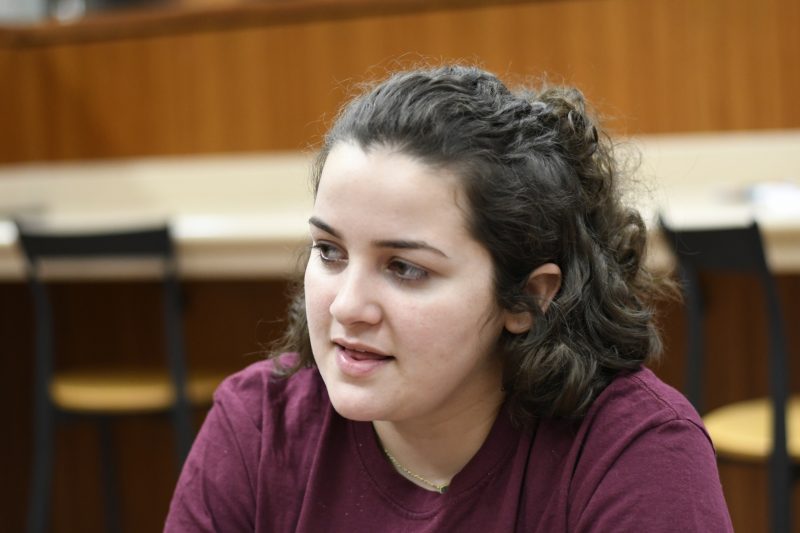College can be really awesome because students live away from home and away from parents, with a roommate their own age. But college can also be really difficult for those exact reasons. Unexpected problems are bound to arise; when they do, Resident Assistants (RAs) at Trinity are ready to help.
Trinity RAs are more than just problem-solvers, though. They have to be therapists, rule-enforcers and advisors too. The duties of an RA vary depending on the situation, which means that they also must be adaptable.
Ben Brody, sophomore RA in the first-year area, explained that the RAs’ principal responsibility is to help ensure students’ social success.
“It’s our job to assist new college students with the transition from home life to college life, which essentially entails personal development, questioning what you know and finding your own voice,” Brody said.
The way RAs carry out this main goal looks different depending on the time of year.
“In the beginning of the year — as in, New Student Orientation and adjusting to classes — I spend a lot of time each day with residents as a group and individually, asking probing questions, helping them go through their own thought process, making their own sort of discoveries, and I spend a LOT of time walking from place to place with people, showing them the campus and helping them find their bearings,” Brody said.
As the year progresses, RAs in the first-year area start to take a less active role in residents’ lives as friend groups start to settle in and first-years start to get their feet under them. This is when RAs must strike a balance between ‘active’ and ‘passive’ programming.
“In addition to the proactive one-on-one [meetings] that we do, we have bulletin boards and posters that we put up that have much more subtle advice, like spring break safety tips, or relationship advice. RAs are college students too; we don’t always have all the answers, which is why we’re required to — and make it a point to — cite our information from where we get it online,” Brody said.
Aside from their academic and social success programming, RAs have more rule-enforcing and administrative-type duties. They complete ‘rounds,’ or patrols, of their section of campus. One RA is on rounds every weekday night, and two RAs are on rounds every weekend. They aren’t actively looking to bust anyone, but they are obligated to report policy violations when they see them.
Though rounds and other rule-enforcing duties continue throughout the school year, towards the end of the second semester, RAs take even more of a step back from first-years in terms of social and academic guidance. Sophia Arriazola, a senior RA in the first-year area, explained that the first-years are usually ready for this step back.
“As the year ends, we’re expecting them to be more independent people and ready for sophomore college,” Arriazola said.
Of course, not all RAs work only with first-years. Tahlar Rowe is a senior RA for HOPE Hall, where she gets to work with students of all years. She said the experience has been incredibly rewarding.
“It’s really great to be able to get to know people on a personal level. In HOPE Hall, it just furthers that community, because you not only know people as your residents, but you also know people as your brothers and sisters on the hall, because we’re all in HOPE Hall and that’s a big family within itself. I’ve been in HOPE Hall four years, so I’ve never lived anywhere else but HOPE hall, so clearly I’m very in love with HOPE Hall,” Rowe said.
All three RAs enthusiastically praised the job as one of the most enriching experiences that they’ve had at Trinity.
“Being an RA is the most valuable thing I have done at Trinity, and the most valuable thing anyone can do at Trinity as a student,” Brody said. “I get to experience all the joys of parenthood, of mentor-ship, of sibling-hood… It’s like being an older sibling without fighting all the time or having to share things. You create a sense of community, you give advice in tough situations and you get to help someone’s experience be better than yours.”
Arriazola also enjoys helping and watching her residents grow and mature.
“I’ve been in the first-year area [for three years], so the first-years that I had my very first year on ResLife are juniors, about to be seniors … It’s really cool to see the growth and development, and some of them will still come back to my room or still hang out, and so that’s really sweet. When they come back and they’re like ‘I’m doing great now,’ or ‘you really helped me with this,’ that’s just really rewarding,” Arriazola said.
Rowe appreciates the personal connections she has been able to form with her residents.
“[My favorite thing is] being able to establish relationships with students, especially my first-years,” Rowe said. “I’m a resource — when they have questions they can easily come to me and be able to ask me, and I can answer questions. And if I can’t [answer them], I can figure out who can answer the questions for them. [It’s] kind of being like a mentor.”
The job, while one of the more difficult positions at Trinity, pays dividends in terms of social connections. A great RA can really make a difference in a student’s college experience, so don’t forget to show your RA some love!







